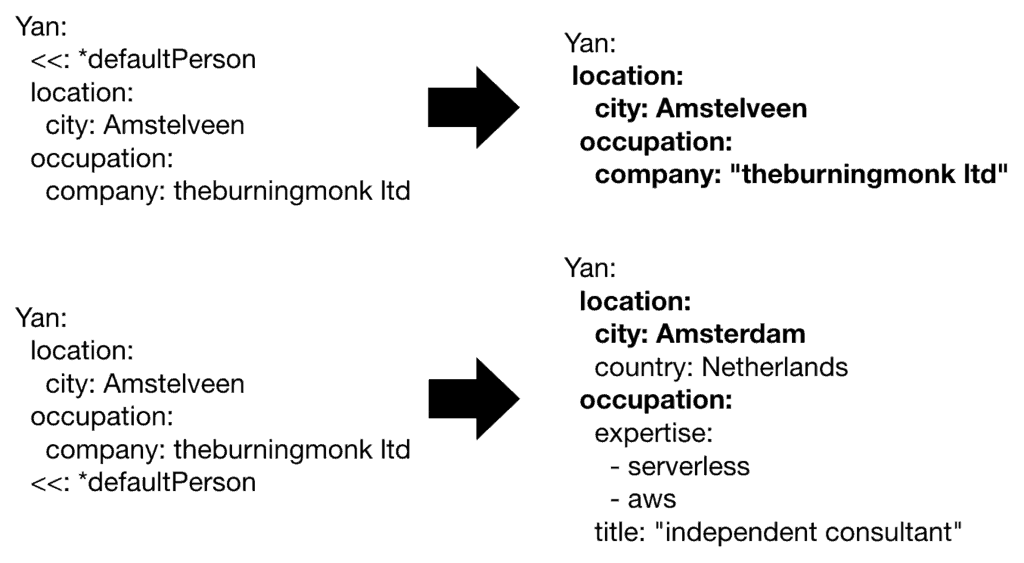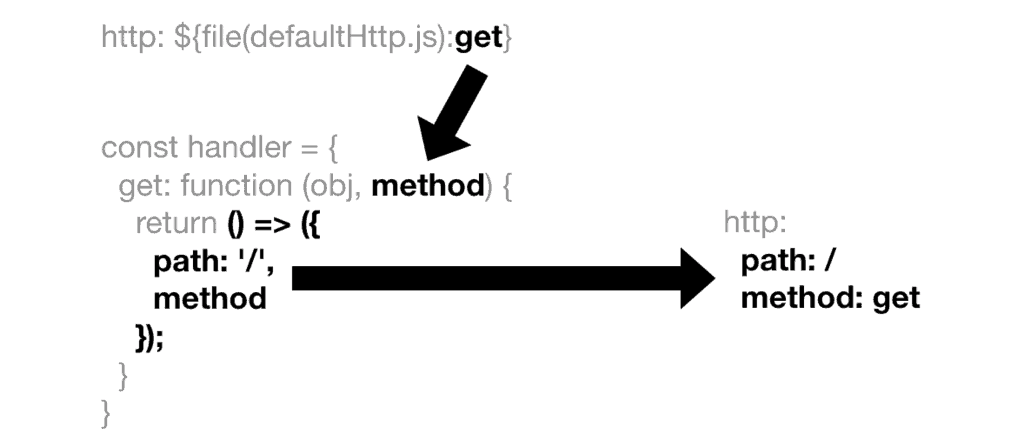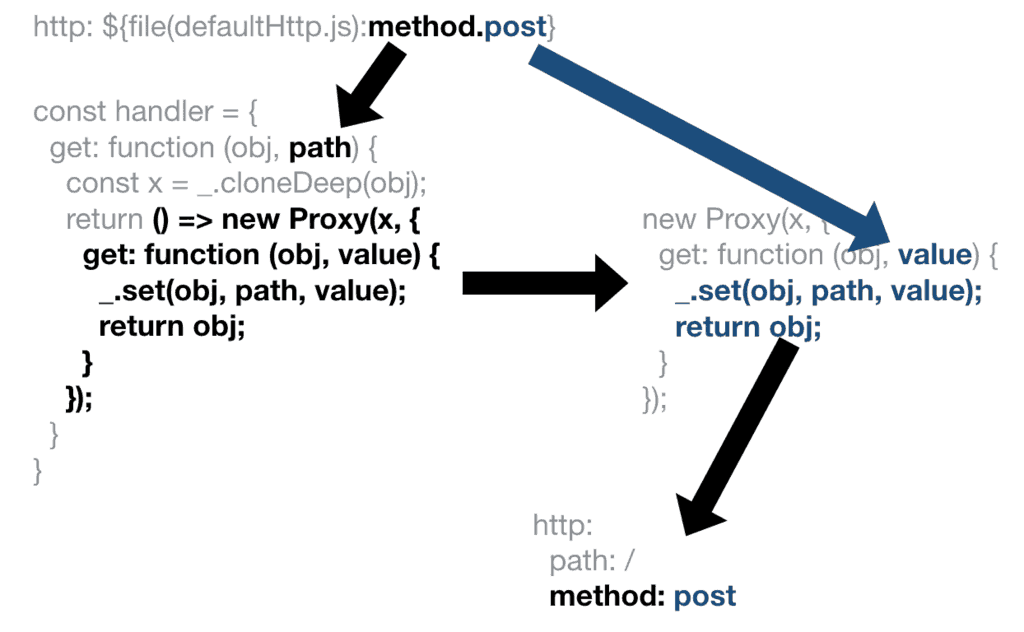
Yan Cui
I help clients go faster for less using serverless technologies.
The Serverless framework lets you reference external JSON, YML and JS files using the syntax ${file:(fileName):propertyName}. However, you can’t customize these external config files with runtime arguments.
A reader asked me:
“I have this boilerplate that is repeated many times in my serverless.yml, how do I reuse the boilerplate but override only specific fields?”
It’s an interesting question and here are some potential solutions.
Disclaimer: the below examples use the HTTP event source for the sole purpose of illustrating the solutions with a trivial configuration object.
YML anchors
The simplest solution is to use YML anchors. You can define and apply the anchor and override specific fields. For example:
service: anchor-example
defaultHttp: &defaultHttp
path: /
method: get
provider:
name: aws
runtime: nodejs8.10
functions:
index:
handler: index.handler
events:
- http:
<<: *defaultHttp
- http:
<<: *defaultHttp
method: post
If the boilerplate is large, then you might wish to put the boilerplate into a separate file. Unfortunately, I haven’t found a way to make anchors work with external config files in the serverless.yml. I’m not able to import the content of an anchor from another file (as below). Please let me know in the comments if you know what I have done wrong here.
defaultHtml.yml
path: / method: get
serverless.yml
service: anchor-example
defaultHttp: &defaultHttp
${file:(./defaultHttp.yml)}
provider:
name: aws
runtime: nodejs8.10
functions:
index:
handler: index.handler
events:
- http:
<<: *defaultHttp
A bigger problem with anchors is that it’s difficult to replace nested fields. For example, given the following anchor:
defaultPerson: &defaultPerson
location:
city: Amsterdam
country: Netherlands
occupation:
title: independent consultant
expertise:
- serverless
- aws
Suppose I want to change location.city and insert a new field occupation.company. Look what happens if I apply the overrides before and after the anchor:

AFAIK, the only way to make this work is to declare multiple anchors:
defaultPerson: &defaultPerson
location: &defaultLocation
city: Amsterdam
country: Netherlands
occupation: &defaultOccupation
title: independent consultant
expertise:
- serverless
- aws
Yan:
<<: *defaultPerson
location:
<<: *defaultLocation
city: Amstelveen
occupation:
<<: *defaultOccupation
company: theburningmonk ltd
It’s getting a bit messy though.
JS Proxy objects
The Serverless framework lets you reference an external JS file too. But you can only reference properties and not invoke methods. This makes it difficult to make a customizable boilerplate config.
For example, if I want to template the HTTP event source configuration but allow the method to be customizable. Ideally, I would like to be able to do something like this:
index:
handler: index.handler
events:
- http: ${file(defaultHttp.js):withMethod("get")}
- http: ${file(defaultHttp.js):withMethod("post")}
Unfortunately, since I can’t invoke methods, I would need to wrap them into properties, e.g.
const generateConfig = (method) => ({
path: '/',
method
});
module.exports.get = () => generateConfig('get');
module.exports.post = () => generateConfig('post');
Then I would be able to reference them in the serverless.yml:
index:
handler: index.handler
events:
- http: ${file(defaultHttp.js):get}
- http: ${file(defaultHttp.js):post}
That’s a two-step process. Fortunately, with ES6 Proxy we can do better!
We can return a Proxy that traps any attempt to access a property on the exported object. The attempted property name (e.g. get) is used to construct the actual config object we will return.
const handler = {
get: function (obj, method) {
return () => ({
path: '/',
method
});
}
}
module.exports = new Proxy({}, handler);
And this is what happens when I reference ${file(xyz.js):get}:

With this simple technique, I can create a boilerplate config which you can customize a field even if it’s deeply nested. For example:
const handler = {
get: function (obj, city) {
return () => ({
location: {
city, // customize a nested field
country: 'Netherlands'
},
occupation: {
title: "independent consultant",
expertise: ["serverless", "aws"]
}
});
}
}
module.exports = new Proxy({}, handler);
And import the config like this:
custom:
yan: ${file(defaultPerson.js):Amstelveen}
But wait! Can I insert/update a property at an arbitrary location, like in the defaultPerson example earlier?
Well, yes, you can do that by returning another Proxy from the first Proxy.
For example, the following config object lets you update either path or method, or insert a new field.
const _ = require('lodash');
const template = {
path: '/',
method: 'get'
};
const handler = {
get: function (obj, path) {
const x = _.cloneDeep(obj);
return () => new Proxy(x, {
get: function (obj, value) {
_.set(obj, path, value);
return obj;
}
});
}
}
module.exports = new Proxy(template, handler);
You can then reference it in the serverless.yml like this:
functions:
index:
handler: index.handler
events:
- http: ${file(defaultHttp.js):path./index}
- http: ${file(defaultHttp.js):method.post}
Which creates the endpoints as you’d expect:
endpoints: GET - https://xxx.execute-api.us-east-1.amazonaws.com/dev/index POST - https://xxx.execute-api.us-east-1.amazonaws.com/dev/
This is what happens when I reference ${file(xyz.js}:method.post}:

But wait again! Can you customize the config with more than one variable? E.g. what if I want to customize both path and method?
You can have a Proxy that returns another Proxy that returns another Proxy and so on. So conceivably it’s possible.
As suggested by Philipp Beau, you can also create a scheme to support key-value pairs in a comma-separated fashion. For example, ${file(xyz.js):key0_value0-key1_value1}
I’ll leave that as an exercise to you, the readers. Let your imaginations go wild and let me know what practical problems you are trying to solve. (I love a good hack, but solving actual problems are always more rewarding ;-))
Whenever you’re ready, here are 3 ways I can help you:
- Production-Ready Serverless: Join 20+ AWS Heroes & Community Builders and 1000+ other students in levelling up your serverless game. This is your one-stop shop for quickly levelling up your serverless skills.
- I help clients launch product ideas, improve their development processes and upskill their teams. If you’d like to work together, then let’s get in touch.
- Join my community on Discord, ask questions, and join the discussion on all things AWS and Serverless.
